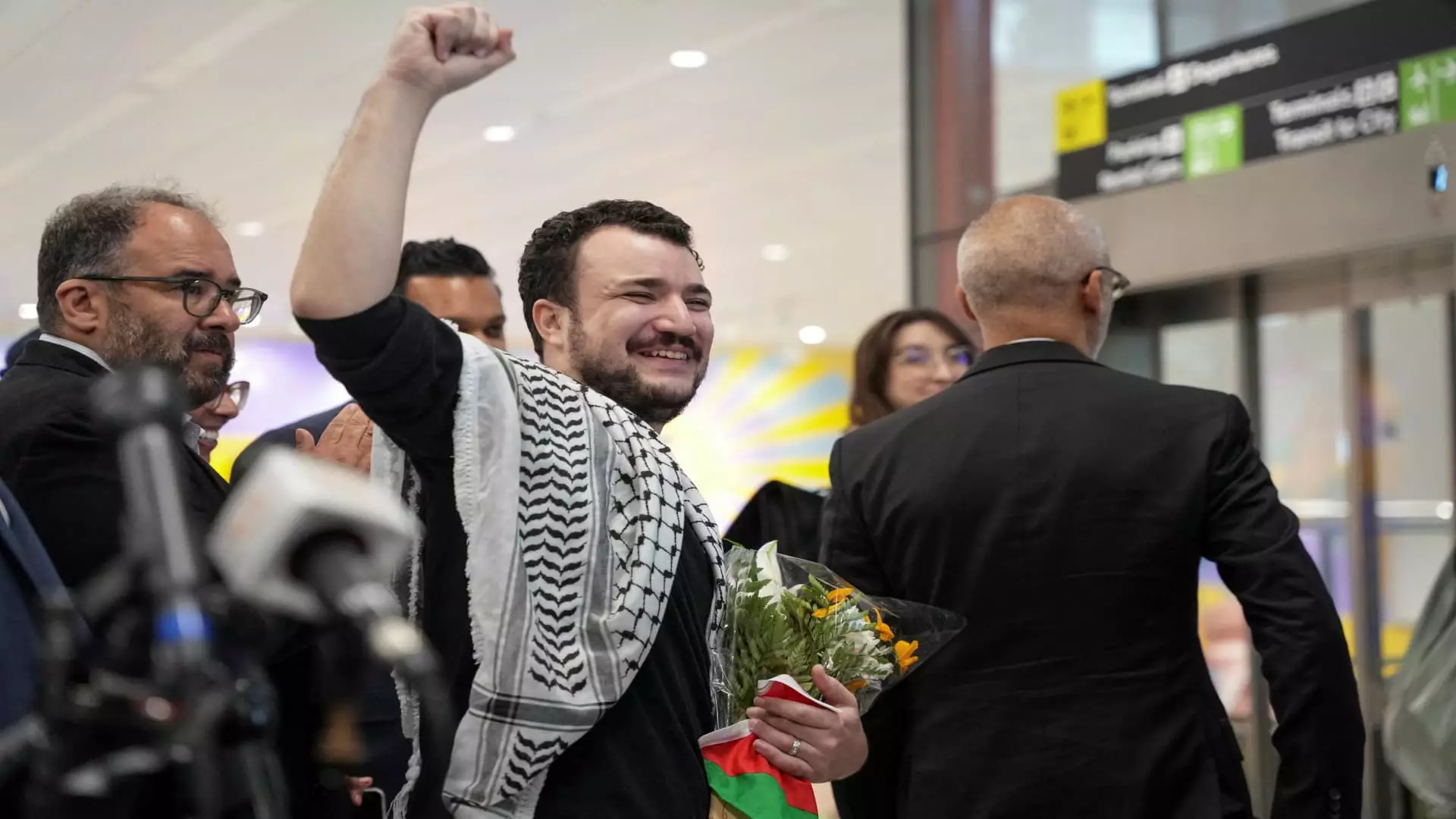In a world where political dissent can lead to imprisonment, the case of Columbia University student Mahmoud Khalil serves as a stark reminder that the battleground for justice often lies within the very institutions meant to uphold it. After enduring more than three months in ICE detention, Khalil’s return to Newark is not just a personal victory; it epitomizes the ongoing struggle for free expression in an increasingly repressive environment. Arrested for his pro-Palestinian activism and described by many as a political prisoner, Khalil’s story raises pressing questions about the place of dissent in American society.
Khalil’s arrest followed his participation in peaceful protests regarding the Gaza conflict, where he ardently voiced the suffering experienced by Palestinian communities. These protests, however, were perceived not as expressions of free speech but rather as threats to national security by the Trump administration—a concerning characterization that reveals the treacherous blurring of civil liberties and political agendas. Khalil made it abundantly clear that despite his harrowing experience, he remains vehemently committed to advocacy, asserting that he would “speak up for Gaza” regardless of the consequences. His defiance marks him not merely as a victim, but as a symbol of resistance against systemic oppression.
Political Persecution Under the Guise of Security
Rep. Alexandria Ocasio-Cortez’s assertion that Khalil’s detention was politically motivated is crucial in understanding the broader implications of his case. When a government deploys immigration authorities to undermine political discourse, it sets a dangerous precedent. Here, the lines of legality blur as accusations trump fundamental rights. While Khalil’s detention is an exceptional case, it reflects a growing trend: the suppression of dissenting voices under the guise of national security—a move that should alarm all Americans, regardless of ideological leanings.
The administration’s invocation of national security to justify Khalil’s detention also raised eyebrows. An NBC News investigation into the government’s claims found them riddled with unverified information and anecdotal evidence. Khalil stands as a testament to the fact that in an age of information warfare, truth often takes a backseat to coercive narrative control. The invocation of the Immigration and Nationality Act of 1952 as a weapon against dissent highlights the potential for misuse of law—transforming a system designed for protection into a mechanism for oppression.
Personal Narratives and Collective Responsibility
Khalil’s story is not unique, and the implications extend beyond his individual fate. The plight of fellow academics such as Rümeysa Öztürk, another international student apprehended amidst similar circumstances, paints a disturbing picture of targeted efforts to quell pro-Palestinian activism on American campuses. The fact that both Khalil and Öztürk were detained indicates a chilling pattern: targeting individuals based on their political beliefs, particularly ones that challenge the status quo.
Moreover, Khalil’s wife, Dr. Noor Abdalla, who gave birth to their son while he remained incarcerated, illustrates the intertwined nature of personal and political repercussions. The emotional toll on families under such duress cannot be understated, as they navigate the complexities of legal battles, societal stigmas, and the ongoing trauma of their loved ones’ experiences. The consequences are widespread, impacting communities and challenging the very ideals of liberty and justice that America purports to uphold.
A Call to Action: The Fight for Justice is Never Over
As Khalil returned to New York, his words resonated with a collective urgency—“my existence is a message.” He transcends the role of a mere victim and emerges as a beacon of hope in dark times. The aftermath of his ordeal presents an opportunity for collective action. It demands rigorous dialogue about the hostility faced by activists and the fundamental right to protest. The willingness to confront powerful entities that aim to silence dissent is not just a matter of political ideology; it is a question of moral responsibility.
Supporting today’s activists means recognizing the nexus between local and global struggles for human rights. Khalil’s declaration resonates beyond borders, imploring others to acknowledge that fighting against injustice is not simply a rallying cry for one community, but a universal mandate. In every protest against oppression, echoes of Mahmoud Khalil’s words remind us to stand firm against brutality wherever it appears, reaffirming that justice is not just an outcome but a continuous battle—one that requires unyielding resolve on behalf of all who cherish liberty.


Leave a Reply